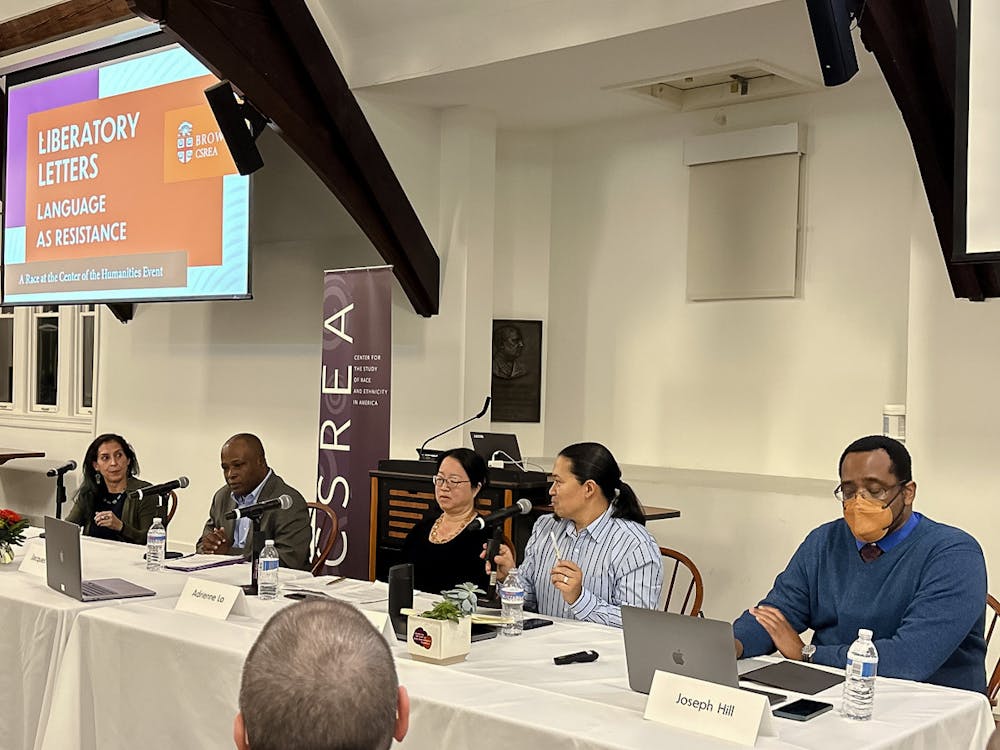Four linguistic scholars discussed race, ethnicity, language and resistance at a roundtable discussion sponsored by the Center for the Study of Race and Ethnicity in America and the Cogut Institute for the Humanities Thursday evening.
The event, titled “Liberatory Letters: Language as Resistance,” explored “the confluence of race, ethnicity, linguistics and culture in order to better understand the acts of expression and resistance that characterize the practice and preservation of language,” according to the event description. Invited speakers shared remarks regarding Haitian Creole, Indigenous languages, Asian American linguistic experiences and Black American Sign Language.
Jacques Pierre, lecturing fellow of romance studies at Duke University, kicked off the panel by discussing the development and future of Haitian Creole as a language of resistance.
Pierre began with a history of Haitian Creole, explaining that the language came about from enslaved people’s need for common language and solidarity.
“A multitude of … African languages were spoken by enslaved people,” Pierre said. “Because enslaved people did not share a common language, it was impossible for them to communicate and join forces quickly and cast off the shackles of slavery.”
Solidarity among enslaved people in Haiti, Pierre said, relied on “the language they created, which is Creole.” For enslaved people, this language became “the sole vector of communication to resist, plan, strategize … and fight for their freedom.”
“As the saying goes, communication is power,” Pierre added.
He noted that Creole “has come so far” since its creation but has “a long way to go.” For example, while virtually all Haitians speak Creole, French “remains the language of public administration, especially in written form.”
But Pierre said he is confident in Creole’s expansion because it “is the only language that unites all Haitians and … captures the heartbeat of the country.”
Creole “can be seen as a model of resistance, creation and freedom,” built to create a “new life where skin color should not be seen as a symbol of superiority,” Pierre concluded.
X̱’unei Lance Twitchell, professor of Alaska Native Languages at the University of Alaska Southeast, continued the panel with a discussion of preserving Indigenous languages.
The erasure of Indigeneous languages “has been intentional,” Twitchell said. “If you live in North America and you are an Indigenous person, the various survival of your language is an act of resistance.”
Today, many Indigenous languages only have a few speakers, many of whom are older speakers, he explained. Learning these languages is important — it provides an “understanding of cultural values” and connections to past generations.
Twitchell shared his proposal to bolster Indigenous language education in Alaska, where he currently teaches. “If you graduate from high school in Alaska, you need to take one semester of one of our 23 Indigenous languages,” he said.
Discussions such as the panel are important because they can build “awareness of what Indigenous peoples are doing and what they need,” Twitchell added.
The panel continued with Joseph Hill, associate professor of American Sign Language and Interpreting Education at the National Technical Institute for the Deaf at Rochester Institute of Technology. Hill discussed the past, present and future of Black American Sign Language.
BASL, which has been around for 150 years, originated in southern schools in the United States. “In the South, (schools for deaf students) didn’t sign in the same style” as schools in other regions “because of regionalisms.”
The language has faced erasure, Hill explained. For example, ASL documentation has intentionally excluded signs used in BASL. Additionally, while laws protect ASL as a language, there are no similar protections for BASL.
Hill explained that his research on BASL should be understood using a lens of intersectionality.
“Often, people are aware of different layers and levels of systemic oppression that influence this work,” Hill said. “But also oftentimes, people don’t think about ableism, being oppressed based on disability, and audism, the oppression of deaf people or the people who have an inability to hear.”
Today, online spaces are useful tools to preserve and share BASL. Hill said that internet spaces can allow people to document, communicate and publish material related to BASL.
Adrienne Lo, associate professor of anthropology at the University of Waterloo, concluded the panel discussion with a discussion of Asian American identity and experiences related to language.
She discussed the ways in which Asian American people must navigate expectations surrounding the languages they speak.
“They want us to learn standard English but then say that we always fall short,” Lo said. “They tell us that we need to maintain our heritage languages, but mastering both is framed as compromising our ability to speak the standard.”
Contradictory linguistic expectations for Asian American people create social pressures to “signal our ability in all of these (language) varieties, but not too much and not in the wrong ways,” Lo said. For example, speaking English “is both seen as necessary economically but also as an emblem of being whitewashed.”
In opposition to these pressures, Lo cited measures that scholars have proposed to exercise their agency.
“We can refuse settler logics of language and identity,” Lo said. “We can refuse labels like ‘semi-speaker’ or even ‘heritage language speaker’ because such labels measure us in terms of distance from some truly authentic monolingual speaker.”
Lo discussed these measures as a path forward regarding language and resistance to oppression.
“Thinking with these scholars about more productive ways to mobilize concepts like agency, resistance and liberation can move us toward a more just and equitable future,” Lo said.

Neil Mehta was the editor-in-chief and president of the Brown Daily Herald's 134th editorial board. They study public health and statistics at Brown. Outside the office, you can find Neil baking and playing Tetris.





